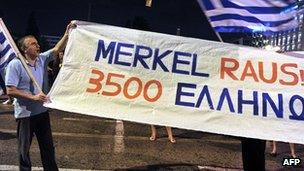Angela Merkel's Greek gamble
- Published
- comments

Protesters with banners saying "Merkel out!" have been gathering ahead of her visit
The centre of Athens will be locked down today. Nearly 7,000 police have been deployed. The square opposite the Greek parliament - the forum for many a protest - has been declared off limits.
Public gatherings have been banned in other parts of the capital. A visit by the German chancellor has led to the biggest security operation in memory.
Greek Prime Minister Antonis Samaras promises to receive her as the leader of a great and friendly country. The streets might be less welcoming. Already a banner has appeared outside parliament in German calling on Mrs Angela not to whine. "We have nothing left in the cupboard to give," it reads.
Chancellor Merkel has gambled that the visit will demonstrate she intends to stand behind the Greeks. It is a way of silencing those in her own coalition who say the country is a bottomless pit.
The country needs another loan from the second bailout fund by the end of November or it will run out of money. The troika of the EU, the IMF and the ECB is in negotiation with Athens over finding another 13bn euros (£10.5bn, $16.8bn) in savings. Greece has been given until 18 October to agree the cuts and tax increases.
Expect a short-term fudge. Somehow or other Greece will be judged to be on the right path. Already the international lenders are considering giving Greece two more years to reach the target for reducing the deficit.
The head of the eurogroup Jean-Claude Juncker says substantial progress has been made in recent weeks and days but a crunch is coming and the IMF may deliver it.
Despite two bailouts and private investors accepting losses on their Greek holdings, Greek debt continues to rise. It stands at 346bn euros or 179% of GDP. The IMF believes that figure could reach 182% by next year.
The agreed target is for Greek debt to be brought down to 120% of GDP by 2020. Almost no-one believes that is now possible. That is a problem for the IMF. Its rules dictate that it can only continue lending if the programme is sustainable.
The IMF doubts that it is. Officials are suggesting another write-down will be necessary. This time, however, it can't be private investors that will take a hit. It will be national governments and perhaps the ECB. That would be very sensitive. Others are talking of a third bailout that would struggle to get passed in the German parliament.
So Chancellor Merkel may well be supportive of Greece today but it cannot but be a gesture. The Greek economy has shrunk by 23% in five years. Further cuts are on the way.
The deficit this year will be higher than announced. The problem of Greece, which has hung over Europe for three years, is far from solved despite the official launch of the eurozone's new bailout fund on Monday.